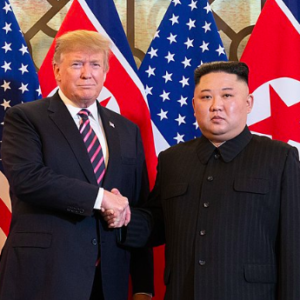President Donald Trump’s thinking on a deal with North Korea is difficult to figure out. He’s less transparent, actually, than Kim Jong-un.
We know perfectly well that Kim is not about to give up his nuclear weapons program, including the missiles to send them to distant targets. He wants more, much more, than merely an end to sanctions. The United States has to “guarantee” North Korea’s security, and the way to make that happen is for the United States to withdraw most of its 28,500 troops from South Korea and close its bases.
That’s not too likely, right? It’s tempting to say that Trump might make significant concessions the next time he sees Kim, but surely he’s not going to do anything so drastic as to strip away basic U.S. military strength, is he?
True, Trump has already stopped joint U.S.-South Korean military exercises, other than war games conducted on computers, and he’s fired John Bolton, who as national security adviser was one of two Americans whom the North Koreans hated the most. The other, of course, was and is Secretary of State Mike Pompeo, blamed along with Bolton for stopping Trump from making a meaningless deal with Kim when they met in Hanoi at the end of February.
It’s easy to accept as an article of faith that Trump, since he professes to like Kim so much, to have such great chemistry with him, should be happy to surrender much more. All Kim has to do, according to this logic, is to save face for Trump by giving an appearance of beginning to advance toward denuclearization.
Then again, with Trump, you can’t be too sure. Having said he’s hoping for a third summit with Kim in the fairly near future, he might have been expected to talk up that idea in his address before the U.N. General Assembly on Tuesday.
But no, after hammering away at both China and Iran, Trump had almost nothing to say about North Korea other than a reminder that the North “must denuclearize” as a condition for economic rewards. That’s a promise we’ve heard repeatedly.
Then, wittingly or not, in the single 30-word sentence that he devoted to North Korea, Trump made a comparison that the North Koreans had to have found quite annoying. Just think how furious they were about Bolton’s comparing North Korea with Libya, which had not produced a warhead before Muammar Gadhafi halted his program.
OK, then, how about comparing North Korea with Iran, which Trump reviled as ruled by a murderous regime against which sanctions would remain until the mullahs showed some sense. “I truly believe that, like Iran,” said Trump, North Korea is “full of tremendous, untapped potential.”
Was Trump implying that North Korea, like Iran, is spreading terrorism against which the United States has to fight? And why, if he has so much “love” for Kim, did he not mention Kim’s supposedly peaceful overtures, the prospects for negotiations among experts from North Korea and the United States, maybe even a third Trump-Kim summit?
The North Koreans must be trying to figure out the meaning and significance of the Iran comparison — that and the short shrift that Trump gave them. The failure to mention Kim by name must be downright hurtful. One has to wonder if Kim will even want to see Trump for a third summit as long as Trump is going to stick to “denuclearization.”
Just as strangely, Trump also had nothing to say about South Korea — no thanks to President Moon Jae-in for having spearheaded the whole pattern of peace through dialogue and no passing mention of Moon’s vision of the Demilitarized Zone as a “peace park.”
Moon’s own U.N. speech was visionary in the extreme. Does he really think Kim would assent to a “mutual security guarantee” while the South is building up its defenses with American arms, including the latest F-35 fighter planes? And will Kim be in any mood to go along with Moon’s idea of “co-prosperity,” a “peace economy” — one in which presumably they could trade and invest freely?
Moon did mention “denuclearization” several times but was quite circumspect about it. A certain skepticism was apparent when, like Trump, he remarked, “If North Korea makes sincere efforts to implement denuclearization, the international community should also reciprocate.”
That’s a big “if.” Kim is not going to stand for Moon lecturing him about “sincere efforts” to do anything, much less give up the nukes and missiles on which he’s staked his power and prestige.

